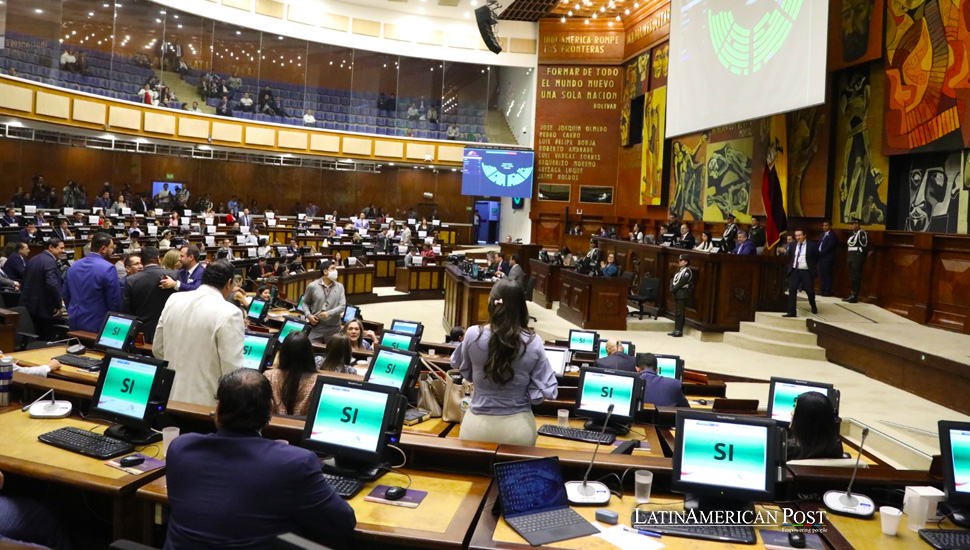Ecuador’s Assembly Rejects VAT Increase Aimed at Funding Security Measures

In a significant legislative decision, Ecuador’s National Assembly voted against President Daniel Noboa’s proposal to raise the value-added tax (VAT) to fund a crackdown on criminal gangs, highlighting the complexities of balancing economic policies with urgent security needs.
Defeat of VAT Hike Proposal
In a decisive turn of events that underscores the challenges of addressing escalating violence through fiscal policy, Ecuador’s National Assembly has firmly voted down a proposed hike in the value-added tax (VAT), a move that President Daniel Noboa had championed as a cornerstone of his security strategy against the country’s criminal elements. The rejected proposal, which sought to increase VAT from 12% to 15% until 2026 and stabilize it at 13%, failed to secure the necessary legislative support. It marked a notable defeat for the Noboa administration with 83 votes against and 43 in favor, alongside nine abstentions.
This legislative decision arrives at a critical juncture for Ecuador. This country has seen its reputation as a tranquil destination for foreign retirees marred by an alarming surge in violence. The pandemic’s economic fallout has exacerbated the nation’s security woes, with high-profile incidents such as armed invasions of live TV broadcasts, the assassination of a presidential candidate, and deadly prison riots capturing international headlines. These events have sown fear among Ecuadorians and sparked a burgeoning demand for self-defense measures and urgent calls for governmental action to restore peace and order.
While lawmakers turned their backs on the VAT increase, they did throw their support behind a one-time measure to levy a tax on bank profits ranging from 5% to 25%, a move expected to generate $145.9 million. This decision reflects a strategic shift towards alternative funding sources for the government’s security initiatives, given that Ecuadorian banks have historically been exempt from profit taxes. The government had projected that the VAT hike would bolster state coffers by approximately $1.1 billion annually, funds earmarked for combating the country’s deep-seated criminal issues.
Triumphs and Setbacks in Noboa’s Legislative Journey
Both triumphs and setbacks have marked President Noboa’s legislative journey. Prior successes include securing legislative approval for an electricity bill aimed at bolstering energy generation and attracting foreign investment and a tax reform designed to incentivize youth employment. However, the recent VAT vote highlights the complexities and political nuances of navigating security funding through taxation, particularly in a heightened public sensitivity to economic pressures.
The Assembly’s decision reflects broader societal concerns about the impact of increased taxation on living costs, particularly in a nation still grappling with the economic repercussions of the COVID-19 pandemic. Critics of the VAT hike argue that such measures could burden the country’s most vulnerable populations, further straining an already fragile social fabric.
Conversely, proponents of the tax increase viewed it as a necessary evil to secure the financial resources needed for a comprehensive security overhaul. They argue that without significant investment in law enforcement, judicial reform, and community programs, Ecuador risks descending further into the grip of organized crime, threatening not only its citizens’ safety but also its economic stability and international reputation.
The Assembly’s vote sends a clear message to the Noboa administration about the need for innovative approaches to security funding that do not overly rely on broad tax increases. It underscores the importance of engaging in broader dialogue with legislators, civil society, and economic stakeholders to identify sustainable, equitable solutions to the country’s security challenges. The government will need to explore alternative funding mechanisms, focusing more on targeted taxes like the one approved for bank profits, international cooperation, and strategic reallocation of existing resources.
Critical Questions and Rethinking Security Strategy
The rejection of the VAT increase proposal also raises critical questions about Ecuador’s capacity to address its security crisis without substantial new funding. It challenges the government to rethink its strategy for combating crime, potentially shifting focus toward preventive measures, community engagement, and regional cooperation to tackle cross-border criminal activities.
As Ecuador navigates this complex landscape, the outcome of this legislative episode serves as a potent reminder of the delicate balance between economic policy and security imperatives. While facing a setback, the Noboa administration is presented with an opportunity to reassess and recalibrate its approach to ensuring national security in a manner that is both effective and economically sustainable. The coming months will undoubtedly test the government’s resolve and ingenuity in rising to this challenge as it seeks to restore peace and stability to a nation that has endured significant turmoil.
Also read: Brazil’s Lula Predicts Growth and Inflation Stability in 2024
The National Assembly’s decision against the VAT increase for security funding marks a pivotal moment for Ecuador. It highlights the nuanced interplay between fiscal policy and public safety, compelling the government to pursue a more holistic, inclusive approach to national security. As Ecuador continues to confront the specter of organized crime, the lessons learned from this legislative episode will undoubtedly shape the country’s trajectory toward a safer, more prosperous future.





